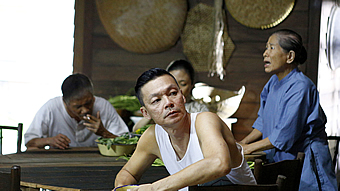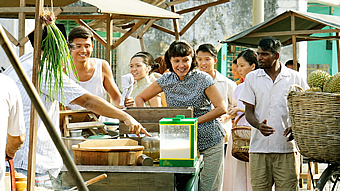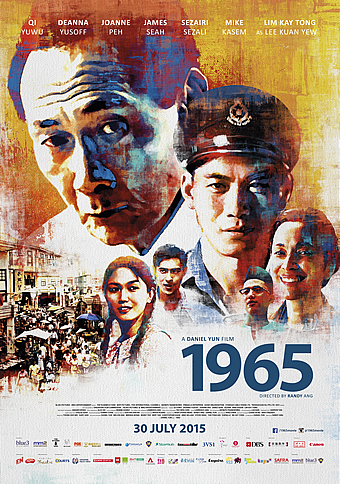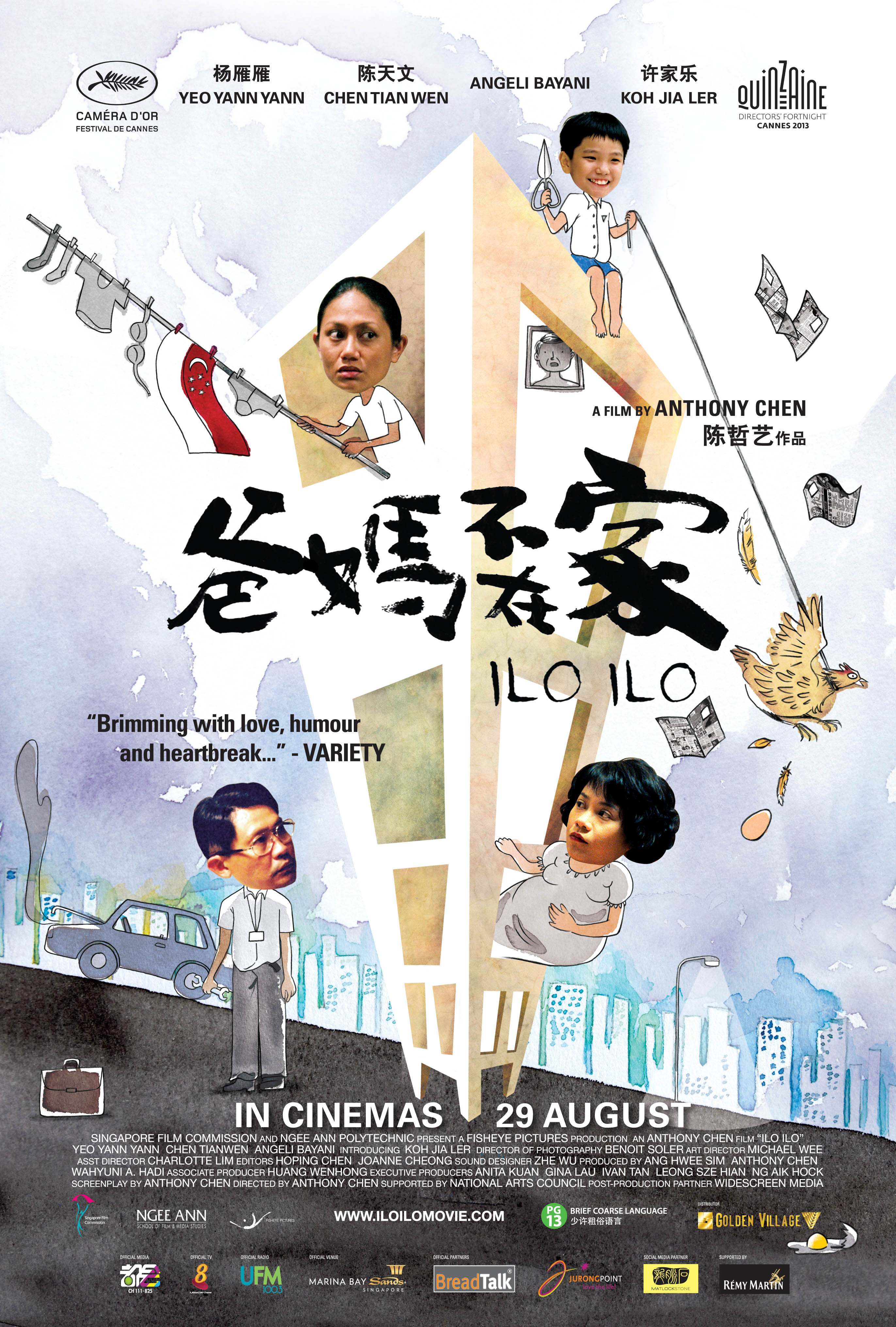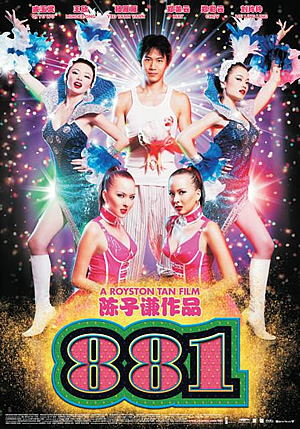LONG LONG TIME AGO (我们的故事) (2016)
Genre: Drama
Director: Jack Neo
Cast: Aileen Tan, Mark Lee, Wang Lei, Suhaimi Yusof, Ryan Lian, Benjamin Tan, Yan Li Xuan, Ng Suan Loi, Charmaine Sei
Runtime: 1 hr 52 mins
Rating: PG13 (Brief Nudity)
Released By: mm2 Entertainment, Golden Village Pictures, Shaw
Official Website:
Opening Day: 4 February 2016
Synopsis: LONG LONG TIME AGO follows the trials and tribulations of a family from 1965 to the early 1970s. Their journey through the years from their humble kampong to a modern HDB flat, runs in parallel with Singapore’s early growth. On 9 August 1965, Zhao Di (Aileen Tan) is driven from her husband's home. The same night, she gives birth to twins, Shun Fatt and Su-mei. Unfortunately, Su-mei is born with two moles on her face – a sign of misfortune for the family. Under her family’s pressure, Zhao Di is forced to give Su-mei away. This is only the first of many challenges, but with Zhao Di’s indomitable spirit, the family perseveres to make a better life for themselves. Over the years, the family witnesses every step of the nation’s growth.
Movie Review:
‘Long Long Time Ago’ is our very own Jack Neo’s ode to a bygone era from half a century ago, so it is no coincidence that this tale of a family who lives through Singapore’s formative years of independence begins on the very day that we were kicked out of Malaysia.
It is on that day that a very pregnant Zhao Di (Aileen Tan) is driven out of her husband’s home by his first wife, and moves back with her three daughters to stay with her father (Wang Lei), her second brother Ah Kun (Mark Lee) and his family, and third brother Ah Xi (Benjamin Tan).
The analogy is straightforward – like Singapore, Zhao Di finds the burden of her own survival thrust onto her on 9 August 1965, and it is hardly any surprise that her subsequent display of tenacity and indomitable spirit as she perseveres to provide for her immediate and extended family are pretty much the same qualities that have been celebrated as the fundamental elements of our nation’s success.
Out of sheer narrative contrivance too, it is on that very day that Zhao Di gives birth to a pair of twins – a boy named Shun Fatt with one mole on his face as well as a girl named Su-mei with two – and while the former is regarded as a sign of prosperity, the latter is seen as bad luck to the family and promptly given away to a wealthy but childless plantation owner (played by none other than Neo himself) and his wife.
As narrated by Zhao Di’s oldest daughter Su-ting, theirs is a story of the trials and tribulations of the family through the early years of Singapore’s independence, with this first part of a duology (yes, this is like ‘Ah Boys to Men’ and ‘The Lion Men’ a story split in halves) spanning a four-year period.
That is enough to see Zhao Di go from selling soya bean milk and beancurd from a makeshift push-cart, where she has to contend with frequent spot-checks by the health inspectors and gangsters demanding protection money, to setting up a stall in the canteen of a factory at the start of Singapore’s industrialisation programme.
Along the way, Neo highlights several iconic moments in our history, including the first Identity Card (IC) registration in 1966, the first National Service (NS) call-up in 1967, the first elections since independence in 1968, the race riots of 1969, and last but not least the big floods in the same year over Hari Raya Puasa.
Each of these junctures is intended as a turning point for the population at large as well as for our characters, but as well-intentioned as these signposts of our history are meant to be, Neo (who shares screenwriting credit with Link Sng and Ivan Ho) struggles to weave them into the individual and collective fates of the latter.
Indeed, Ah Kun’s cynicism about Singapore’s ability to survive without a hinterland as he stands in line during the 1966 nationwide IC registration exercise seems to vanish as soon as he reaches the head of the queue; ditto for the concomitant apprehension expressed by his Malay neighbour Osman’s (Suhaimi Yusof) wife about staying in a Chinese-majority country vis-à-vis migrating to live with a majority up north. On the other hand, there is hardly any attention paid to how Ah Xi feels as the first batch of male citizens called to perform their national duty, even as he dutifully reports for enlistment.
In particular, Neo’s attempt to make the 1969 race riots personally relevant for his characters feels especially awkward and unwieldy – not only is it puzzling why Ah Kun, who had never before expressed any racially discriminatory sentiments, would suddenly spread mistruths and disinformation about the Malays attacking the Chinese, Neo’s ultimate point about how fragile our racial cohesion is and how important inter-racial friendships are to keeping the peace and harmony comes off sounding didactic.
It is only right at the end does Neo finally manage to translate a historical milestone into something momentous for his characters, as Neo recreates – with some generous help from CGI – the torrential downpour on 10 December 1965 that led to the worst floods in Singapore in over three decades. In that event, Neo captures the fear, anxiety and helplessness of those living in the ‘kampungs’ through Zhao Di and her family, who find their house gradually inundated by the rising waters and paralysed by the dilemma whether to wait for help or make their own way to higher ground.
That finale is as dramatic and emotionally gripping as it gets, but it also underscores just how indifferent the rest of the ‘checkpoints’ in history have been to his central narrative. Therein lies the crux, or should we say crutch, of Neo’s film – by trying to balance the significant events in Singapore’s history with the ups and downs of a family living through that era, it ends up being too episodic and scattershot to truly resonate.
In effect, it is when Neo allows his story to develop more organically that his film comes alive – and a good case in point is the relationship between Zhao Di and a local gangster Ah Long (Ryan Lian) which evolves convincingly from intimidation to mutual gratitude. Ditto for the sibling tension between Zhao Di and Ah Kun in the last act, especially as the latter grows increasingly resentful of his sister’s modest success and demands to have a share of her relative wealth.
That these character relationships come off surprisingly engaging is also credit to the largely excellent ensemble. Mark Lee and Aileen Tan are some of the most seasoned local performers, and Neo has designed their characters to play to their respective strengths as an actor – the former brash, hot-headed and egotistical, while the latter gentle, restrained yet quietly resilient. Lei continues to be a reliable supporting act as their archaically superstitious father, while Yusof adds a nice dose of lightness as the cheery Osman. Once again, Neo demonstrates his eye for new talent, and his revelation here is Lian, whose dangerously menacing turn as the head of the local gang 706 is mesmerising to watch.
It is no secret that Neo is a big fan of nostalgia, and ‘Long Long Time Ago’ is probably his boldest attempt yet to translate his own personal experience into a compelling portrait of history. His enthusiasm and attention to detail is right up there on the screen – not just in the visually accurate representations of the ‘kampungs’ and streets of pre-HDB Singapore supplemented with painstakingly sourced archival footage, but also in how he captures the heartbeat of ‘kampung life’ through the norms and values of its people (such as gender preference or 重男轻女).
That his depiction of Singapore in its early years will resonate with those who have lived through the era is an understatement, but beyond that familiarity, there is little else that does – not the boorish Ah Kun and his manipulative ways, and maybe ever just so slightly Zhao Di and her quiet resolve. What should be poignant ends up leaving you feeling detached and apathetic, and there are also not enough laughs to compensate for the lack of compelling familial drama. Perhaps the best praise for this middling blend of history and fiction is that it is much, much better than last year’s ‘1965’, but ‘Long Long Time Ago’ still has a long, long way to go to become that definitive tribute to our past.
Movie Rating:




(Jack Neo's attention to setting and detail in depicting Singapore's early years is impressive, but an uneven and scattershot narrative that tries too hard to weave significant events in Singapore’s history with the ups and downs of a family in that era ultimately leaves his viewers emotionally indifferent)
Review by Gabriel Chong
You might also like:
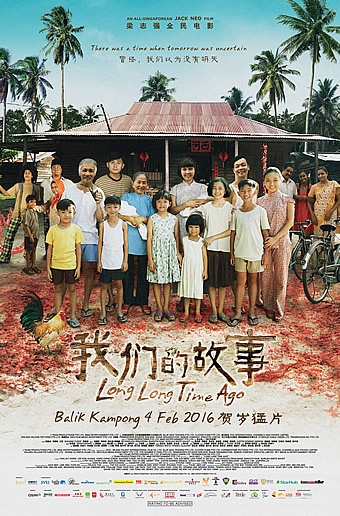
Movie Stills
